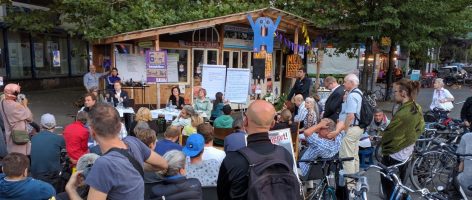
Kenton Card was a DAAD/AGI Research Fellow at AGI in July and August 2017, and a PhD Student in the Department of Urban Planning at the University of California, Los Angeles. At UCLA he is also an advisor to the Institute on Inequality and Democracy and an Editor of Critical Planning Journal. Kenton has taught at UCLA, Marlboro College, and The Public School, Berlin. His broad intellectual interests include urban political economy, housing movements, displacement, and race. Kenton’s non-academic professional work includes advocating on behalf of environmental and housing interests in Sacramento, CA, with The Planning and Conservation League and Housing California, and ongoing work as an organizer with the Residents United Network and member of the Los Angeles Tenants Union.
During his time at AGI, Kenton conducted research on a project called “Multi-Ethnic Housing Struggles in Berlin and Los Angeles.” The project investigates how communities mobilize urban social movements against economic hardship, inequality, and racism, in order to transform local neighborhoods, urban planning practices, and city policies. Minority and immigrant communities and their grassroots mobilizations broadly play a pivotal role challenging the ongoing global political shifts right that have been propagating xenophobia, racism, and economic, political, and social isolationism. In this historic configuration, housing serves as a central site of struggle, as a fundamental human right.
Kenton’s research methodologically mobilizes qualitative political economic analysis of various housing struggles across the two cities through assembled field observations, interviews, documentary film, and personal participation. Urban political economy must expand its epistemological assumptions by integrating the history, thought, and resistance of the most dispossessed. Herein multi-ethnic housing mobilizations in Berlin and Los Angeles—both majority-renter Western cities—operate in defense and offense of housing. Communities mobilize in defense of the current low-income housing stock and on the offensive to increase the low-income housing supply. In both cities, some struggles transcend the dichotomous preconceptions that either pure market dynamics or state redistribution can solve the housing question in perpetuity. Multi-ethnic housing movements also propose collective property arrangements as innovations to enhance local democratic accountability through limited-equity cooperatives, community land trusts, and syndicates.
Recent Content

Multi-Ethnic Tenant Movements in Los Angeles and Berlin
Multi-ethnic and immigrant resistance play a pivotal role in challenging the political shifts right, which have been rooted in racism, xenophobia, and social, political, and economic isolationism. Housing movements serve …



